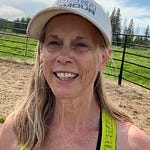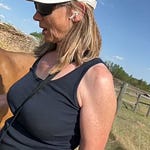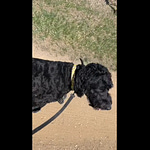Chores, in June, are a lovely thing. I’m not at all a morning person, and so I still don’t really feel grateful and full of the wonder of it all right away, but still…June is so much nicer than January. This year is cool, smoky, and therefore not yet buggy. I followed today’s chore routine with my workout routine which involved a nice long run, in absolutely perfect running weather. Not too hot, not too cold, not too windy! (for a change!), and although the smoke was there, it wasn’t so bad as to make breathing difficult. All in all, quite comfortable to do heavy work outside.
It’s a good day, in other words, to video the process, and think about the chores I could do with my own energetic “inner team.”
Horses, dogs, cats, birds, all are so physically present and communicative through their bodies, and sensory systems. We often forget our animal selves, and it’s too bad, because the lack of friction present in my ability to think about doing something, and to visualize it happening (flawlessly) is jarringly different from the extreme friction present when I decide to do the thing in the “real world.” This disconnect causes me to frequently underestimate the time, effort, and mistakes that will be required for me to complete what my mind considers an easy, inexpensive, short task.
And I know, because I’ve watched sports movies, that visualizing success is very important and counts as practice time to a certain extent. We do need to build neural pathways first, before we start to build muscle, when we are strength training. Both the mind and the body are important for doing something that improves our skill or capacity. But my point is, until I do the thing in real life, I really haven’t done the thing.
Even though the neural pathways are perhaps primed, the muscles and joints and skin and ligaments all still need the chance to adapt to weight, temperature, pressure, force. And this is my constant frustration, because in my inner team, my brain is like Eclipse - quick to take charge of all the resources. She doesn’t want to share. And like Tundra, she also doesn’t like other team members to receive attention.
In my horse herd, I am functioning (most days) as a herd leader. This is slightly different from human predatory models where the leader is the best, strongest, smartest, etc., etc. In a herd, passive leadership (a term coined by Mark Rashid) involves built up trust, wisdom, awareness, presence, and other hard to quantify definers that sometimes mean the horse that looks like it’s in charge is not the horse that the herd relies on in an emergency.
Leadership in a horse herd does not, therefore, require a lot of “dominance techniques.” It does require awareness of body language, and a confident approach to physical actions. It’s not enough to want to be liked. It is far more important to not lie.
I therefore spend time with the herd “overacting” so as to be more comfortable, and congruent, in my physical reality. I use big motions, not because they need them, but because I do. I am so prone to going off in my head, and imagining that the horses can read my mind, that I can dissociate from my body just like that. This is NOT good leadership and no horse in their right mind will appreciate it. Although my horses have definitely forgiven me, adapted to me, and tried hard in so many ways (in retrospect) to cue me as to my dangerous lapses in “being present,” it’s still not a way to gain their confidence.
I really want to get better at “horse language,” because it’s only fair that a horse learning many new tasks and skills should not also have to figure out how to speak human. I need to spend a lot of time, observing, trying to communicate, but also being humble about the results of my attempts. The horses communicate so fluidly and freely with each other (and you can see a lot of “talking” in this video). I am, by contrast, speaking in one or two word phrases, and with a strong accent. Oh well. They are very gracious creatures.
I’m going on and on about a favourite topic, and this is not necessarily exactly what you as the reader are interested in. Okay. Bringing it back.
Our inner teams can be thought of as a “herd,” with separate and very energetic herd members, all jockeying for resources. These can include food, toys, attention, freedom to move, and generally the ability to control everyone else in the area. Without a strong leadership presence, “breakfast” can break down into rather uncontrolled chaos, or maybe even violence.
Leadership in such a situation is not achieved through having the worst behaviour (yelling the loudest, hitting the most, or scaring everyone into submission). That may “work,” but at most, that individual has confirmed their untrustworthiness in the case of trouble. In fact, they are now most definitely going to be seen as a source of trouble.
I’m not going to belabour this point in this post. I just want to point out that I did not need to sedate, restrain, or scare any of the horses, to be safe while feeding them highly coveted meals, in the midst of distracting background events.
And I say this, because I used to need to do those things. In other words, I used to not be a leader, to be quite afraid of my herd, and to try to not get hurt in various ways that were not leadership, but were strategic, coercive, or duplicitous.
I still struggle with leading my inner team, my inner “herd,” in ways that are fair, calm, above-board, predictable, and kind. I often resort to bullying parts of me that I consider weak or pathetic (poor BlueJay is the heart of the herd in truth!). I steal resources from my body to fuel my brain on its crusades to do whatever it wants with no accountability to the laws of physics, whatsoever. I go away, leaving my herd defenceless and leaderless when I am overwhelmed and under-resourced.
All of these actions show a disregard for the language of my team. Also the inherent value of each member of my team. Until I respect them, as wise, sentient, powerful, capable, and friendly individuals, I will continually try to make myself feel safer by being bigger than them, thus trying to make them smaller than “me.” That’s just terrible.
What if our inner teams could be respected, understood, given space and time, fuelled appropriately, protected from the immaturity of each other, and genuinely loved for themselves? What if we could step up to lead our teams in their excited, pushy, shy, hungry, uneasy, tentative, hopeful, endearing states? What if we could build the skills and confidence to do this daily, in all weathers, even when the “ravens” are making a “ruckus?”
For sure, we would experience the world in a more balanced, fluid, adaptable, wide awake, aware, and energetic way, with far less fear.
I think that’s worth doing chores for! Even in January.













Share this post